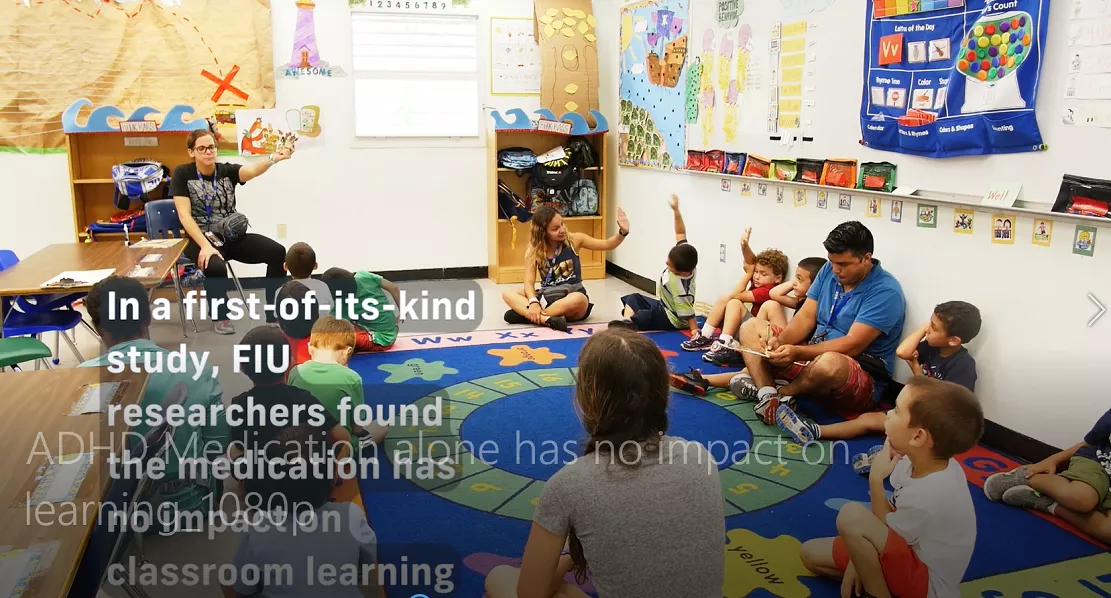For decades, most doctors, parents and teachers believe that stimulant drugs can help children with attention deficit hyperactivity disorder (ADHD) learn However, in the first such study, scientists from the children and family center of Florida International University (FIU) found that drug treatment had no significant effect on the learning level of children with ADHD in the school classroom

In the United States, about 10% of children are diagnosed with ADHD. More than 90% of these people are prescribed stimulant drugs as the main form of treatment in the school environment because most doctors believe that drug treatment will bring better academic performance to children.
William E. Pelham, Jr., the first author of the new research paper and director of the children's and family center, said: "doctors and educators have always believed that medication can help ADHD children learn, because they will complete more seat assignments and spend more time on tasks after medication. Unfortunately, we found that medication has no impact on the learning of actual course content."
The researchers assessed 173 children aged 7 to 12 with ADHD who participated in the center's summer treatment program, an eight week comprehensive summer camp program for children with ADHD and related behavioral, emotional and learning challenges.
The children completed two consecutive stages of teaching vocabulary and scientific and social research for 25 minutes a day. During the three week period, the guidance provided to each student is the grade level they have determined. Certified teachers and assistants teach these materials to groups of 10-14 children in the classroom.
Each child was randomly assigned to receive continuous release stimulant drug treatment in the first or second teaching stage and placebo in the other stage.
Contrary to expectations, the researchers found that children learned the same amount of science, social research and vocabulary, whether taking drugs or placebos.
Although medication did not improve learning, studies have shown that medication helped children complete more seat assignments and improved their classroom behavior, as expected. When taking the drugs, the children completed 37% more arithmetic problems per minute and 53% fewer violations of classroom rules per hour.
In addition, consistent with previous studies, the researchers found that when taking medicine on the day of the exam, drug treatment slightly helped to improve test scores, but not enough to improve the scores of most children.
It is very important for ADHD children to improve their academic performance, because compared with their peers, ADHD children show more non task behaviors in class, get lower grades and get lower scores in exams. They are also more likely to receive special education services, be repeatable and drop out of school before graduation. Poor academic performance is one of the most frustrating impairments associated with ADHD, which often leads to long-term professional and financial difficulties in adulthood.
Previous studies conducted by Pelham, a pioneer in ADHD research and treatment, have found that behavioral therapy -- if used first -- is cheaper and more effective than drug treatment in treating ADHD children. As a supplementary second-line treatment, stimulants are the most effective for those in need, and the dose is lower than the usual prescription. In addition, the society for developmental and behavioral pediatrics (SDBP) has released new clinical guidelines, which strongly recommend behavioral intervention as the first-line treatment for adolescent ADHD.
Pelham said: "Our research has repeatedly found that behavioral intervention is the best for children with ADHD, because the skills and strategies learned by them, their teachers and their parents will help them succeed in school, family and long-term relationships. Giving our children medicine can not solve the problem - it can only temporarily eliminate the symptoms. On the contrary, families should first pay attention to behavioral intervention and increase drug treatment only when necessary."
For adolescents with ADHD, behavioral and academic interventions that meaningfully improve dysfunction over the long term include parental training and classroom based management tools, as well as school services specifically targeted at academic achievement.
The researchers pointed out that the study was conducted in a controlled environment similar to summer school, and the results may be different in the ordinary classroom environment. They hope to use academic courses in a natural classroom environment and replicate the study over a school year to further assess the impact of drug therapy on learning.